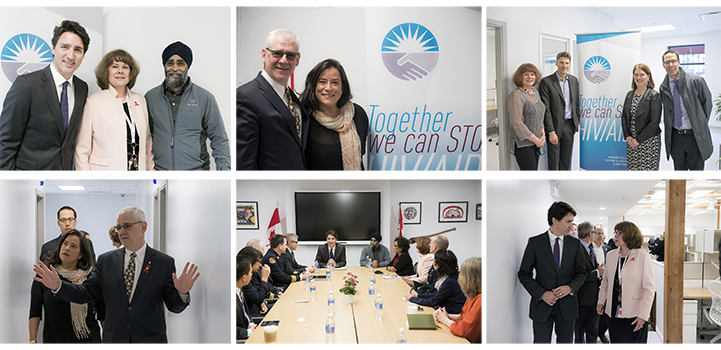
Welcoming a new government that embraces evidence-based science has been a breath of fresh air for researchers across the country after a decade of silence from the Canadian government. This is in stark contrast to the previous Conservative government who fought Insite all the way to the Supreme Court of Canada and, subsequently, passed Bill C-2, which created substantial barriers to the establishment of safe consumption sites. The BC Centre for Excellence in HIV/AIDS (BC-CfE) is deeply appreciative of the support shown for our research in HIV, viral hepatitis and addiction work, part of the government’s commitment to improving the health of Canadians.
The BC-CfE had the pleasure to recently welcome Prime Minister Justin Trudeau, accompanied by Defense Minister Harjit Sajjan, to 625 Powell Street, its newly expanded Hope to Health Research Clinic. The BC-CfE hosted a roundtable discussion with the Prime Minister, first responders and community partners on the overdose crisis. The Hope to Health Research Clinic, located on the Downtown Eastside, is a BC-CfE research clinic which supports research to adapt, evaluate and expand Treatment as Prevention (TasP) to other contagious diseases. Under the leadership of Dr. Julio Montaner, BC-CfE Director, in the beginning, the clinic will focus on three pillars: HIV, addiction and viral hepatitis.
The roundtable meeting was informative and moving as attendees spoke passionately about the overwhelming toll the overdose crisis has had on communities in B.C. To date, B.C. is the only province to declare a public health emergency after experiencing a surge in drug-related overdoses and deaths. Prime Minister Trudeau announced the federal government will provide $65-million over five years to respond to Canada’s opioid crisis, with $10-million earmarked for B.C.
Health Minister Jane Philpott’s visit to Vancouver’s Downtown Eastside last January 2016 during the provincial and territorial ministers meeting, where Dr. Montaner was invited to speak, was yet another sign of the present government’s changing attitudes. Minister Philpott has returned for subsequent visits where she has met with Dr. Montaner, Irene Day, BC-CfE Operations Director, and Dr. Evan Wood, Director of the BC Centre on Substance Use, part of the BC-CfE, for a tour of the Hope to Health Research Clinic and an update on the BC-CfE’s ground breaking research.
Having worked as a family doctor for over 30 years, both in Canada and sub-Saharan Africa, Minister Philpott has not shied away from expressing her commitment to ending the HIV epidemic. The Health Minister and the Canadian Government have both officially endorsed the Joint United Nations Programme on HIV/AIDS (UNAIDS) global targets for HIV, including the 90-90-90 Target. The global Treatment Target calls for 90% of people living with HIV to know their status, 90% of people diagnosed with HIV to be in treatment, and 90% of people in treatment to have undetectable viral loads.
The December 1, 2016, World AIDS Day statement by Prime Minister Trudeau reaffirmed the government’s commitment to eliminating HIV. The statements closes by saying, “The fight against HIV/AIDS is a winnable one. I encourage all Canadians to support efforts to raise awareness about HIV/AIDS prevention through the UN-led #HIVPrevention campaign. By working together with researchers, activists, civil society, other countries, and the courageous people living with HIV/AIDS around the world, we can bring this global epidemic to an end.”
On the heels of Minister Philpott’s visit, Dr. Montaner, and colleagues were honoured to welcome Minister of Justice and Attorney General of Canada, Jody Wilson-Raybould for a discussion and tour of the Hope to Health Research Clinic.
Dr. Montaner and BC-CfE research scientists discussed highlights of their research on HIV, sex work, and substance use.
Minister Wilson-Raybould acknowledged the problem of the over-criminalization of HIV non-disclosure in the criminal justice system. Dr. Kate Shannon, Director of BC-CfE’s Gender and Sexual Health Initiative, also discussed with the Minister how HIV non-disclosure disproportionately affects women in the criminal justice system. Minister Wilson-Raybould was supportive of working with the BC-CfE on these issues.
An important consensus statement signed by Dr. Montaner and 75 other prominent Canadian medical experts reflects the need for the criminal justice system to adapt to better reflect the current scientific evidence on HIV transmission.
The BC-CfE celebrates the federal government’s renewed commitment to support HIV and AIDS domestically and internationally, and we look forward to working together.

